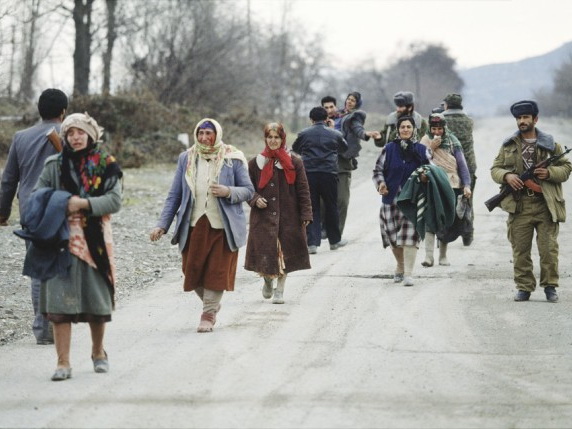The Khojaly Massacre: 27 Years Later is Change on the Horizon?

This year we face the 27th anniversary of the Khojaly Massacre, a horrific tragedy for many, and which for me personally, involved being captured by the Armenian invaders, tortured, and left for dead.
It took me a long time, with much support from my beloved family and my community in my homeland of Azerbaijan, to even begin to speak of what happened, and many years later into today I have emerged as an outspoken advocate for survivors and as a voice for the many who did not make it through.
I can still remember my childhood, and growing up in the idyllic Karabakh region of Azerbaijan, as a schoolgirl and later when I began my first job as a telephone operator. That 20-year old girl could never have imagined that one day she would be a survivor of criminal warfare, that she would have to endure spinal surgeries to repair the damage inflicted upon her by torture, or that she would go through so many things and yet still come out of it strong.
For so many years since the Khojaly Genocide, which occured on February 26 of 1992 when Armenian troops attacked Khojaly murdering 613 Azerbaijani civilians, I along with hundreds of thousands of my countrymen have waited for justice, for the international community to push Armenia, condemned by the United Nations, to vacate the occupied Karabakh territory and return it to the survivors and refugees, who still long to go home.
And we still wait. Yet this year there is a much different light on the horizon, and we stand with hope and anticipation of one day returning to the land we grew up in.
After so many years it seems nearly impossible, but an actual, tangible change is underway. The cruel Armenian leaders that oversaw the massacre of hundreds of innocent Azerbaijanis, as well as the illegal occupation and ethnic cleansing of around 20 percent of Azerbaijan’s sovereign territory, have been replaced, since the 2018 Velvet Revolution in Armenia. Even those so far at the top who thought themselves untouchable have been imprisoned or are being investigated and more accountability is hopefully soon to manifest.

No, they are not being imprisoned or investigated for Khojaly or other crimes against Azerbaijan, but for the crimes they committed against Armenian people. Nevertheless, this is a start and hopefully one day we will see finally all the perpetrators of Khojaly brought to justice. My hope is also that the new leadership is aware of the dire position of Armenia, economically devastated and diplomatically isolated, in need of friends.
The opportunity now for Armenia to relinquish the occupied Azerbaijani lands of Karabakh stands as a powerful threshold for Armenia’s next steps into the future. By doing the only right thing and making peace with Azerbaijan, Armenia can experience a brand new world of opportunity and can stop wasting its extremely limited funds on a criminal war.
It is time for us all to do better. I for one, a survivor of the worst massacre in the entire Nagorno-Karabakh war and a passionate advocate, look forward to this year and the next to be a time of great and transformative change, a time when I and so many other Azerbaijanis can finally return home, to honor the dead we have yet to be able to even visit, to rebuild our homes and communities, our mosques and our schools.
I have recently been honored to be elected to the Steering Committee of the reorganized Azerbaijani Community of Nagorno-Karabakh, serving as a representative of over 80,000 fellow refugees from the region.

As my heart and soul longs to return and reclaim my homeland and to see justice served in my lifetime, I now have the profound privilege to fight for that same dream for the sake of thousands of my Azerbaijani brothers and sisters, so many who would and have done the same for me. Although this, like every Khojaly Massacre anniversary, is a sad affair, this year brings along with it a new and truly inspiring light, and a call to change that actually has a chance at succeeding.
May we honor the victims and survivors in the most powerful of ways, by creating a future that repairs the cruelty and damage that has been done, that recognizes the lives that have been lost and restores the lives and homes of those that made it through.
Durdane Aghayeva is a Muslim woman from Azerbaijan with a special connection to Jewish communities across the world, particularly here in Los Angeles.
Durdane is a survivor of torture and a passionate advocate for peace. She works tirelessly for the empowerment of all survivors, to help others to find strength and healing through the unifying process of sharing.














